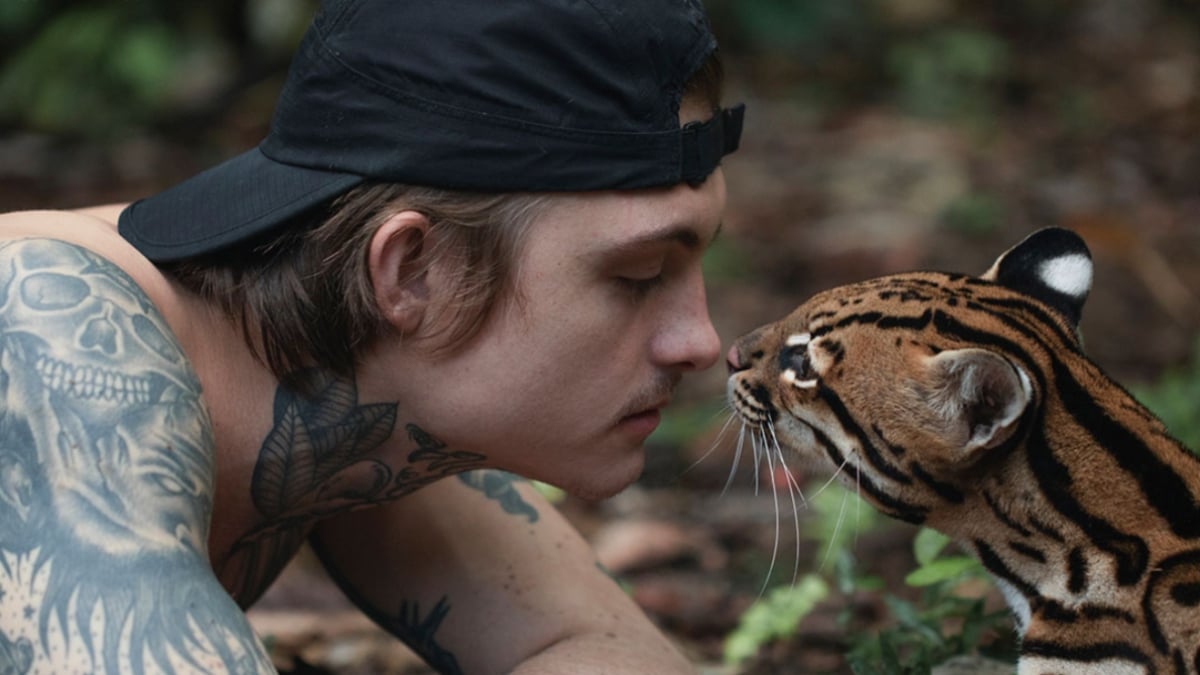
Wildcat on the surface can be viewed as a simple story about a man and his furry jungle companion. It’s easy to judge these books before stretching ourselves beyond the covers.
Wildcat possesses so much more nuance in the study of mankind’s connection to animals. In many ways, we are all lost creatures waiting for someone to rescue us and be brought back to our homes.
In this slice-of-life documentary, the parallels between a man with wartime PTSD are not too different from the animal he is trying to rescue.
Filmmakers Melissa Lesh and Trevor Beck Frost document the lives of Harry Turner and Samantha Zwicker, a couple who work in the Peruvian Amazon attempting to reintroduce animals back into the wild.
The documentary mostly centers on Turner and his tenacious efforts to help ocelots become one with the jungle. Turner himself suffers from a variety of mental health struggles including PTSD, anxiety, and depression–a horrific side effect of fighting in the Afghanistan war.
He signed up as a British soldier at 18 and the emotional toll of his deployment is visibly transparent throughout the documentary.
The distancing of depression
The documentary has a similar essence to the movie Leave No Trace, where a veteran intentionally chooses to live in the woods away from society with his daughter. Similar to Ben Foster’s character in that film, Turner appears to be more comfortable alone in the wild. This makes him the perfect individual to influence a baby wildcat into finding its true nature.
Wildcat shows viewers the difficulties of humans teaching animal instincts in an unpredictable environment. It has moments where it showcases how fragile wildlife can be for the most vulnerable of baby animals. One portion of the film documents a tragedy with one of the rescues and we get a glimpse of the toll it takes on Turner’s mental stability.
This establishes the stakes of the narrative. We see how devastated he quickly becomes when the unfortunate happens beyond his control–and how much it impacts his work and love life with Zwicker.

He becomes depressed, and aggressive, and begins self-harming as a means of achieving euphoria. And we see the correlation of how much the success of bringing one animal’s redemption can also mean his own.
The camera work is wildly adventurous as one can tell these filmmakers were willing to put themselves around dangerous animals and terrains. The amount of backbone it takes to film near giant poisonous spiders, as well as floating alligators, is unfathomable.
The only setback with a documentary such as this is the camerawork has to be approached like The Blair Witch Project in various places, meaning purely handheld to dive deep into areas of the jungle. This is forgivable because it is possibly the only method of chasing a small jungle cat through a forest.
But it’s when we meet Keanu (a rescued ocelot) that the film becomes infectious. At this stage of the documentary, Turner is seeking to find vindication through Keanu. We watch how the two bond, and how Turner and Keanu have such an endearing relationship. It’s difficult avoiding weakness while watching a baby ocelot nibble on Turner’s ears like he is the father.
Where Wildcat differs in comparison to other nature documentaries is the subtext on mental health and how nature itself can be as healing as an antidepressant.
Keanu is getting reacquainted with his home through Turner, and at the same time, Turner is likewise becoming one with his own world again through Keanu. The world that let him down through unnecessary violence. And we see this as Turner himself becomes more willing to be around loved ones and the place he grew up.
The result is a documentary that can be perceived as a character study of the fascinating similarities between man and nature. It’s hard to know for sure if this was the intended thesis when filmmakers Melissa Lesh and Trevor Beck jumped into the project, but the outcome of watching these two lost souls find themselves through each other is unexpectedly purifying.
Wildcat is emotionally raw and heartfelt
In one heartwarming documentary involving a man and a cat, we get so much conversation around the dangers of war, the importance of protecting wildlife, and the urgency of taking mental health seriously.
It’s a cathartic and compelling study of the likeness of man and nature’s healing compatibility. Not to mention, it’s about as emotionally raw as a documentary can get while wearing its jungle-sized heart on its sleeve.
As far as nature documentaries, it’s hard to say whether this is in the top tier of the genre, but the journey of Harry Turner and Keanu might surprise viewers this weekend.
For more reviews, check out our coverage of other films such as The Whale and She Said.
Wildcat is now streaming on Prime Video.